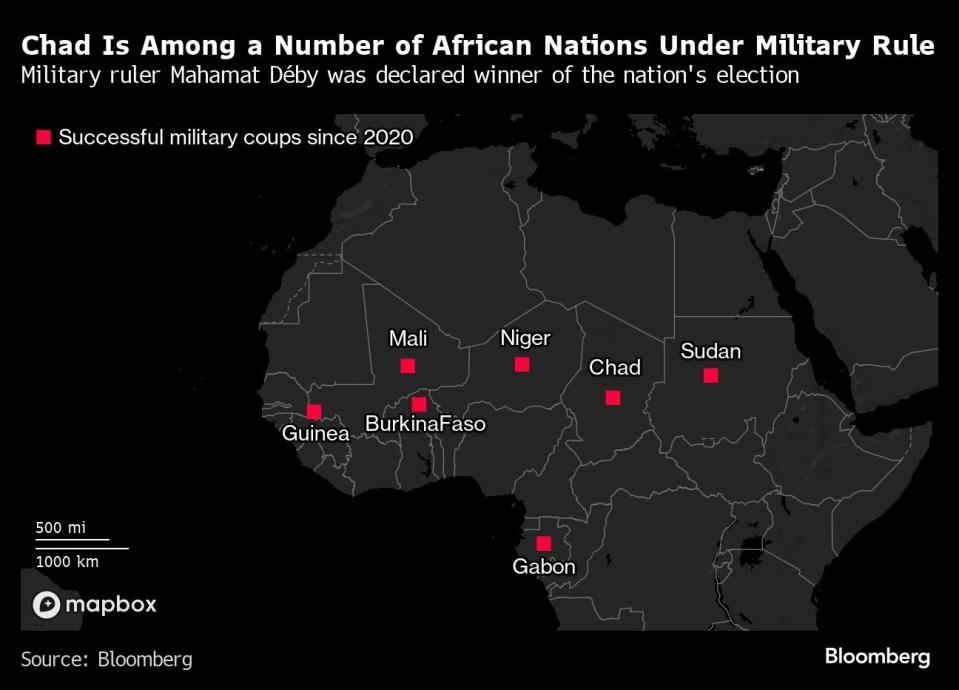Chad’s Military Ruler Cements Power With US Troops’ Presence on the Line
(Bloomberg) -- Chad’s military ruler Mahamat Déby was declared the winner of the nation’s presidential elections, cementing his rule in a country that’s become the last Western military ally in the fight against Islamist insurgents and Russian influence in the region.
Most Read from Bloomberg
Trump Vows ‘Day One’ Executive Order Targeting Offshore Wind
China to Start $138 Billion Bond Sale on Friday to Boost Economy
Putin Names Economist as Defense Minister in Surprise Reshuffle
Global Chips Battle Intensifies With $81 Billion Subsidy Surge
The Central African nation serves as a bulwark of stability in Africa’s Sahel region, where a series of coups in Mali, Niger and Burkina Faso led to the ejection of French troops after their ruling juntas forged closer ties to Moscow. It’s also bordered by Sudan, which has been beset by a yearlong civil war, and counts Libya and Central African Republic as its other unstable neighbors.
In the runup to the election, Déby’s administration asked the US to withdraw its troops from an army base in the capital, N’Djamena, illustrating that the nation’s allegiances may be shifting amid a rise in anti-Western sentiment.
“Western powers will have no option but to work with Déby as the last pro-western and relatively stable country in the region,” said Ulf Laessing, Africa program director at the Konrad Adenauer Foundation. “Chad is too important strategically for the West to boycott Deby. Any Western retreat will be immediately filled by Russia and other players which have been already courting Chad.”
Déby secured 61% of the ballots in the May 6 vote, according to the National Election Management Agency, avoiding a run-off against his main challenger, Prime Minister Succès Masra, who garnered 19% of the vote.
“I’m now the elected president of all Chadians, both those who voted for me and those who didn’t,” Déby said in a brief address on state-owned broadcaster Tele Tchad late Thursday, as celebratory gunfire rang out across N’Djamena.
A 40-year-old army general, Déby came to power after the death of his father — ex-President Idriss Déby who ruled the country for more than three decades. He’s pledged to invest in expanding access to electricity and water, building infrastructure and boosting security in the landlocked oil-producing nation that ranks among the world’s poorest.
Opposition Rejection
The results were rejected by opposition parties. Civil society movement Wakit Tama urged Chadians to “reclaim our stolen victory” in a Facebook post.
Masra in a separate statement claimed a “resounding victory” based on results gathered from polling stations. While he criticized the “small group of people” that have “decided to ignore the will of the majority, he urged his supporters to protest peacefully.”
The statement was an effort to avoid violent confrontations that have erupted in Chad in the past, said Yamingué Betinbaye, a political analyst and research director at the Anthropology and Human Sciences Research Center. In October 2022, a crackdown by security forces on political protests left at least 128 people dead.
The European Union delegation in Chad in a statement May 6 deplored the exclusion of almost 3,000 EU-funded election observers from the polls. Another opposition coalition denounced the elections as neither free nor fair, fueling concern that violence may erupt if the process is seen as tainted.
“Chad’s partners will be monitoring events and, unless they escalate, likely accept the outcome,” Betinbaye said by phone from N’Djamena.
Read More: Oil Rich Chad’s Junta Leader Set to Win Vote as US Ties Fray
(Updates with analyst comments from fourth paragraph, Deby comment in sixth graph)
Most Read from Bloomberg Businessweek
©2024 Bloomberg L.P.




